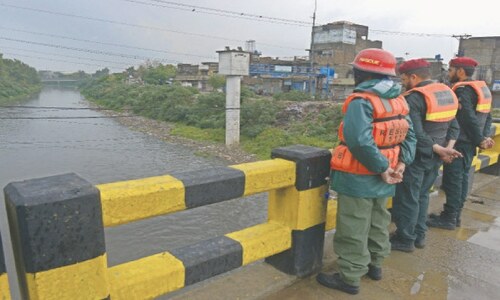ISLAMABAD: The government of Punjab has rejected 19 varieties of genetically-modified cotton seed due to their poor performance.
Sources said both the public and private seed producing companies were pushing the Punjab Seed Council (PSC) for approval of their Bt cotton seed varieties such as FH Lalazar, NIBGE4 and CEMB 66 etc.
“In their meeting on January 7, besides the 19 Bt varieties, the PSC also rejected two non-Bt varieties because they had failed to deliver good yield,” said an expert at the Pakistan Agriculture Research Council (PARC).
Bt or genetically engineered cotton seed varieties were introduced in the country in 2010 to control pests, reduce the use of pesticides and increase yield. Nearly 90pc of all cotton sown in Pakistan is genetically engineered.
However, the predominant two Bt cotton varieties - MNH886 and FH142 - sown across Pakistan since 2012 became vulnerable to diseases and could not tolerate impacts and extremities of climate change as claimed by their producer, Ayub Agriculture Research Institute (AARI), Faisalabad. The two varieties also failed to control pests such as Pink Bollworm (Gulabi Sundi) that has now developed resistance against Bt gene because of low toxin levels.
Seed council also rejects two non-genetically modified varieties due to their low yield
Bt cotton variety, FH Lalazar, failed to deliver high yield during trials conducted on a government farm. Documents show that government trials of FH Lalazar in 2014-15 produced 166 kilogrammes yield per acre against the expected 450 kilogrammes per acre.
Similarly, yield from MNH886 and FH142 also remained unexpectedly low. This year, cotton production wAS around 10 million bales, gradually declining since Bt cotton seed was sown in Pakistan.
Bt cotton has also failed to protect the crop from pink Bollworm in Indian states of Gujarat, Andhrasd Pradesh, Madhya Pradesh, Karnataka and Maharashtra to mention some which are major cotton growing regions. In its report issued on January 4, the International Cotton Advisory Committee (ICAC) predicted how the average yield in Pakistan may decrease by 22pc due to the adverse weather, increased pest pressure from pink bollworm and whitefly and the high cost of inputs discouraging farmers from better crop management.
Farmers in countries that grow 100pc Bt cotton such as Bollgard II, Roundup Ready Flex etc., have started facing major concerns with the genetically engineered technology. A 13pc reduction in harvested area in the United States coupled with lower yields due in part to excessive rains in the autumn are expected to lead to a fall in cotton production of 18pc, the ICAC said. The sale of genetically engineered cotton has already been prohibited in many parts of the US such as Illinois, Nebraska, Michigan, and Indiana.
“The problem is with substandard Bt cotton seed being sold in the market. There are no checks and balances. There are more than 700 seed producing companies and all lack facilities and resources to produce quality seed. Pakistan’s cotton research departments conduct more than Rs1.5 billion worth of research every year but have failed to deliver quality seed,” said Chairman Pakistan Ginning Association Shahzad Ali Khan, who described the country’s cotton industry a dying sector.
He urged the government to do away with anti-farmer policies that were forcing farmers to give up cotton farming and was now growing sugar cane and other crops.
Punjab Minister for Agriculture Dr Farrukh Javed believed that crop failure this year was due to extreme weather conditions coupled with multiple other factors.
“We have never had such heat and rains in the past. The Bt varieties can tolerate weather abnormalities to some extent. Bt cotton has not failed entirely. In Sindh, Bt cotton crop has been spared. Bt cotton worldwide has suffered due to extreme weather causing losses of up to $1.5 trillion,” the official explained.
Dr Javed claimed that the 19 Bt varieties had not been rejected but suspended.
Published in Dawn, January 11th, 2016














































